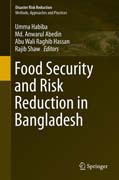
Food Security and Risk Reduction in Bangladesh
Habiba, Umma
Abedin, Md. Anwarul
Hassan, Abu Wali Raghib
Shaw, Rajib
This book draws examples from food security issues in Bangladesh. The book is structured around those issues and underlying causes of food security, the implications from different sectors, policy analysis, and the role and actions of various stakeholders from different sectors to ensure food security.
Bangladesh is situated in a climatically vulnerable position and is impacted frequently by such climatic hazards as floods, cyclones, droughts, and salinity intrusion. Due to global atmospheric changes, abrupt shifts in climatic conditions severely affect Bangladesh’s agriculture. Although Bangladesh has made significant progress in increasing domestic production of food grain, if the production of major cereals is hampered due to climate change, food security will be in jeopardy. Most estimates show that a huge amount of additional food grain will be required to feed the growing population of the country. Ensuring food security for all is the overarching goal of Bangladesh’s national food policy. Therefore, ensuring food security in the future requires a great deal of additional effort in yield improvement, with limited scope for expanding the area under cultivation.
The primary target readers for this book are students and researchers in the fields of environment, disaster risk reduction, and climate change studies. The book will provide them with a good idea of the current trend of research in the field and will furnish basic knowledge on this important topic. Another target group comprises practitioners and policy makers, who will be able to apply collective knowledge to policy and decision making.
- ISBN: 978-4-431-55410-3
- Editorial: Springer
- Encuadernacion: Cartoné
- Fecha Publicación: 14/03/2015
- Nº Volúmenes: 1
- Idioma: Inglés
